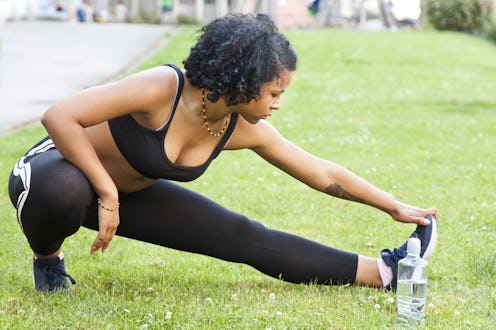Life
How To Set Challenging But Achievable Goals For Your Workouts, According To Experts

So, you’ve decided to ramp up your fitness game in 2019. You might feel awash in excitement, inspiration, and a renewed commitment to your goals. Awesome, right? But how do you keep the momentum of your enthusiasm going once routine sets in, and you hit a setback or two — or when you’re not progressing as quickly as you thought your would goal-wise. The key to keeping up with your fitness goals this year lies in setting workout goals that feel achievable *and* challenging.
“The first thing you should do is specifically define your goal,” Max Zeumer, a fitness consultant for the New York Health & Racquet Club tells Bustle. “Do not be vague: Create a very clear and specific goal that can be measured and timed.”
If sticking to your goals is challenging for you, or if you’re feeling discouraged along the way, that may mean that your expectations for your workouts are too high, Verywell Health says. Getting clear on what you want to achieve, while accurately assessing where you’re starting from, can help. All-or-nothing thinking and perfectionism can trip-up the most well-intentioned fitness enthusiast, Refinery29 says. Setting up a realistic and accessible fitness plan is key.
“The best way to set realistic goals is to have both short-term and long-term goals with values you can measure,” Tara Romeo CSCS, USAW, CES, Director of the Professional Athletic Performance Center tells Bustle via email. “Unrealistic expectations [can] set you up for failure. When you don’t hit your goals, it is very disappointing and the drive to continue on your path to a healthier you goes off track. If you don’t know what is realistic, ask someone! There are plenty of professionals who can help guide you on your journey.”
Creating a game plan of small, attainable goals that you can build on can help maintain a sense positive momentum, Refinery29 notes. A sense of accomplishment can be achieved with surprisingly simple goals, like committing to tagging 10 to 20 squats onto your routine each day.
“If you are starting a new program, start small,” Romeo says. “I have experienced many people who go too hard out of the gate, and either end up hurting themselves or are extremely sore, and then become disinterested in the process. Working out should be a release of stress and time for yourself. Make it enjoyable and find something that interests you. I always recommend trying a group class at a gym, as you are motivated by an instructor, can meet new people, and can commit to certain days and times.”
Entrepreneur writes that SMART, a popular acronym for how to set achievable goals, includes action steps that are specific, measurable, accountable, realistic, and have a set timeframe. Greater specificity regarding your goal setting means that you’re cutting through too-vague aims like, “getting more flexible.” Adding ten minutes of yoga onto the end of your workouts instead, for instance, is a more targeted fitness goal.
Writing down your goals can also help keep you accountable, Entrepreneur says. And while some people find that telling other people about your plans can help, some experts say that this can discourage follow-through by opening you up to judgement. So, whether you choose to include a friend in your fitness plan or go the distance on your own for a while, find what works for you in terms of keeping your commitment to your fitness goals on track. Of course, consistency is pretty critical when it comes to meeting and exceeding any type of goal: If you don’t show up and commit to your plan on the regular, your goals can’t get met.
Checking in with your body, and noting how you feel during and after your workouts, is important for assessing whether or not your pushing against your growth edge while staying within in a safe fitness zone, says Entrepreneur. Both too-easy or super-crushing workouts that you can’t keep up with can stall out your efforts — either through boredom, or feeling discouraged from too-much challenge. Noticing how you feel, and how good your workouts feel to you overall, can help you gauge your progress as you go.
Zeumer suggests researching “stories of others that have achieved the results you’ve wanted,” for inspiration over the long haul. “See what their experience was like. There are a lot of transformation videos that can help you identify what truly is realistic for someone that’s starting where you’re at.”
“Celebrate the small victories and changes because those will lead to the larger, more long-term achievements,” says Romeo. By setting up a game plan of attainable, manageable goals, while enjoying the process in the meantime, your hard work and dedication will pay off over time.